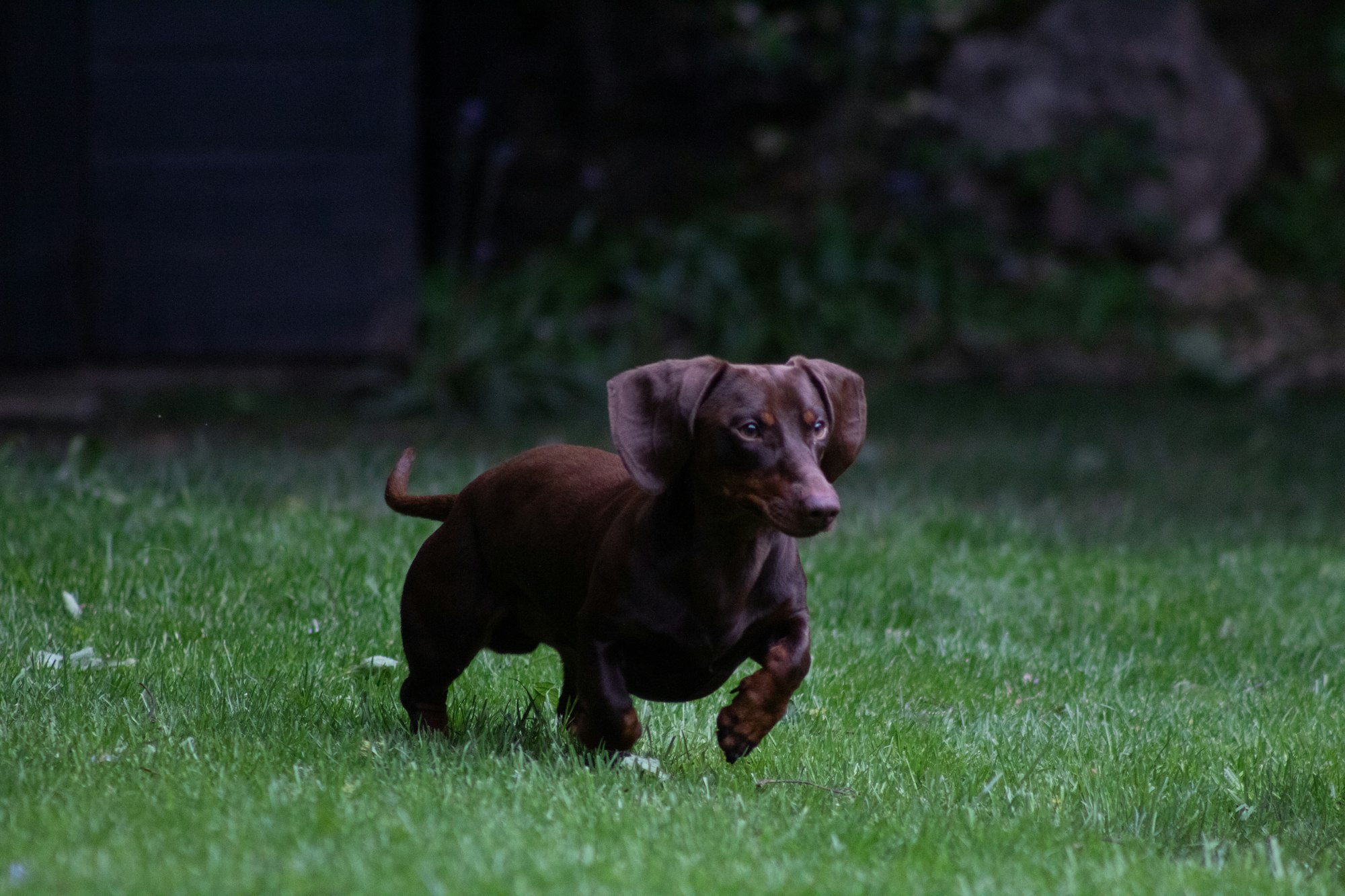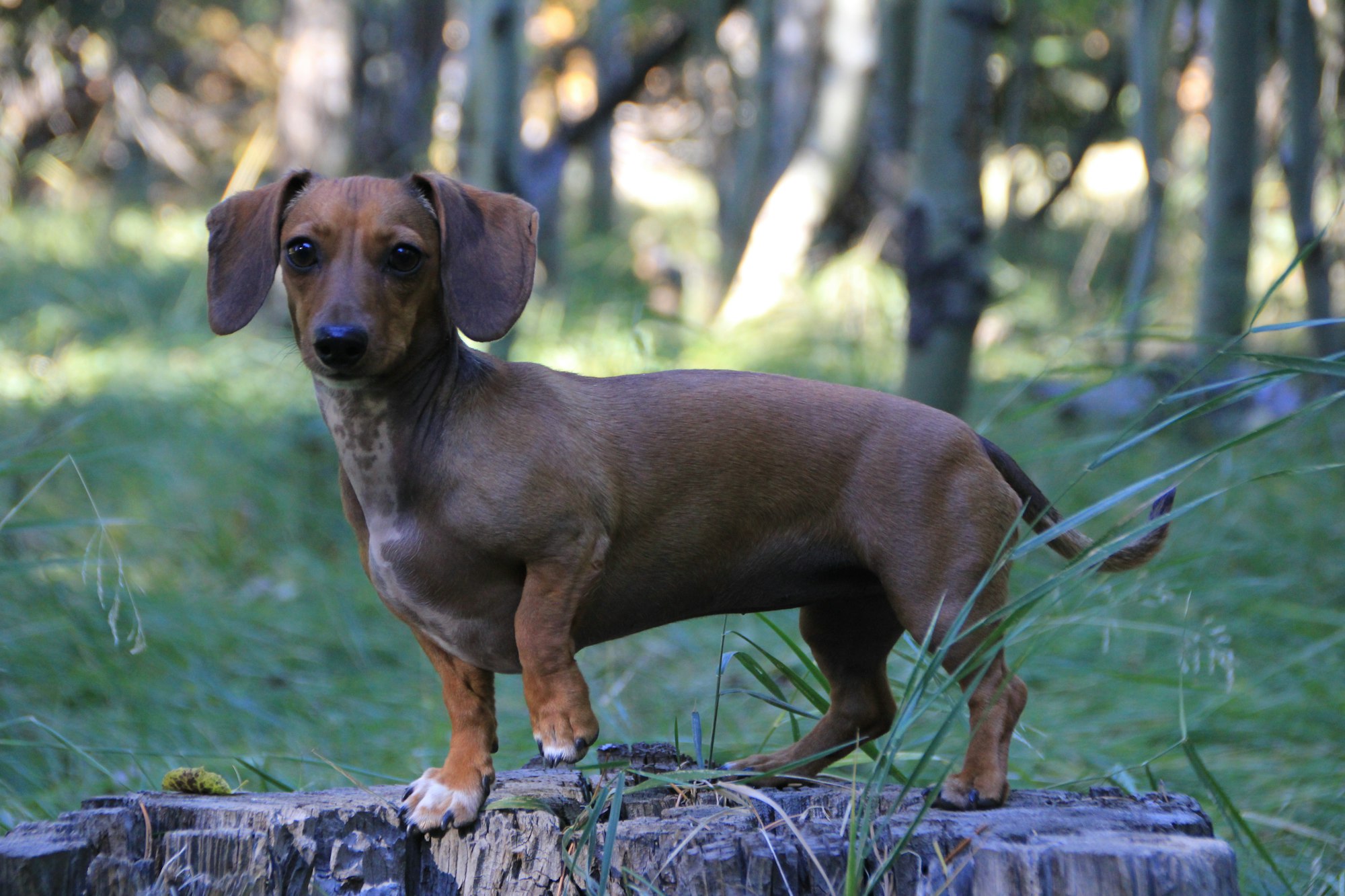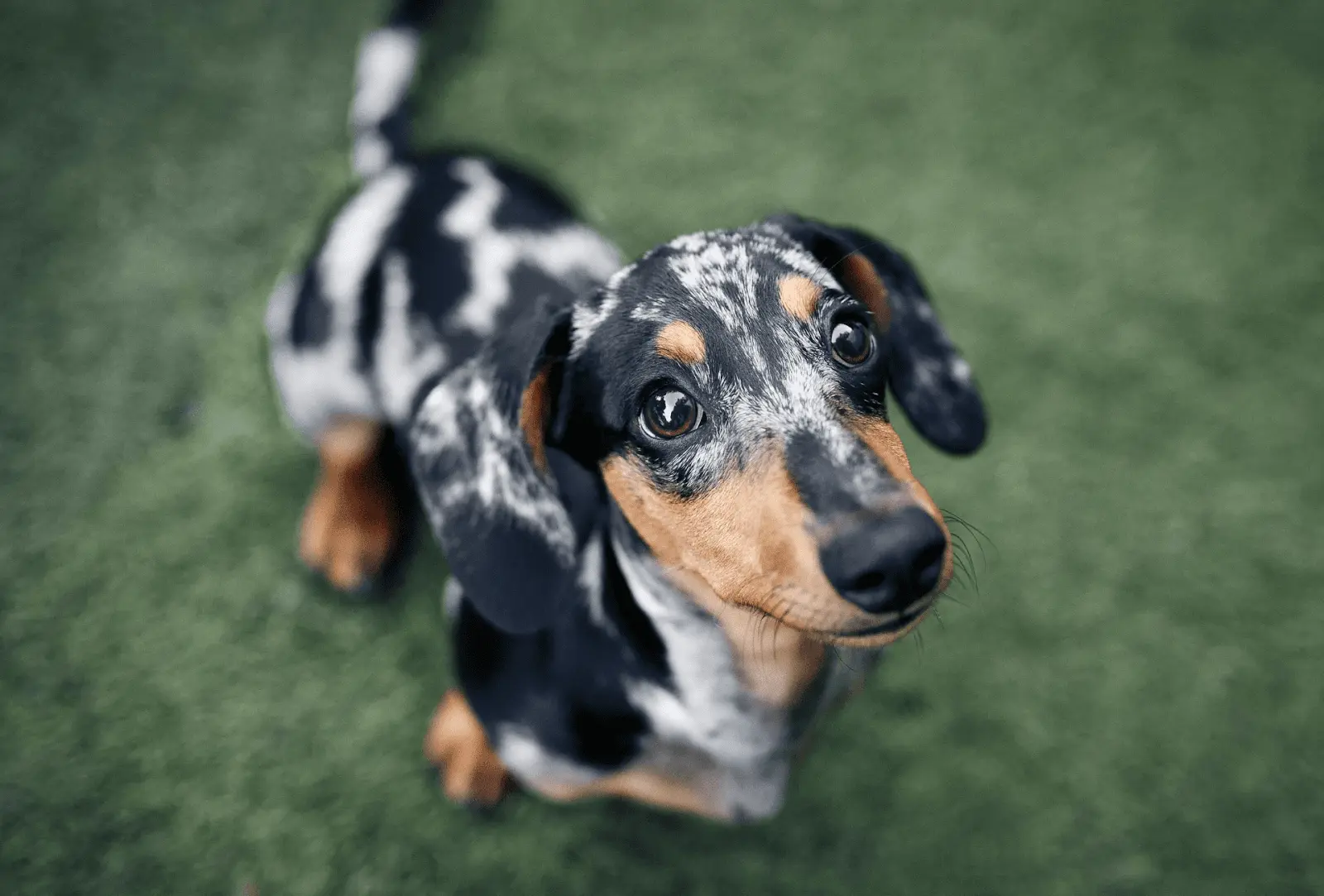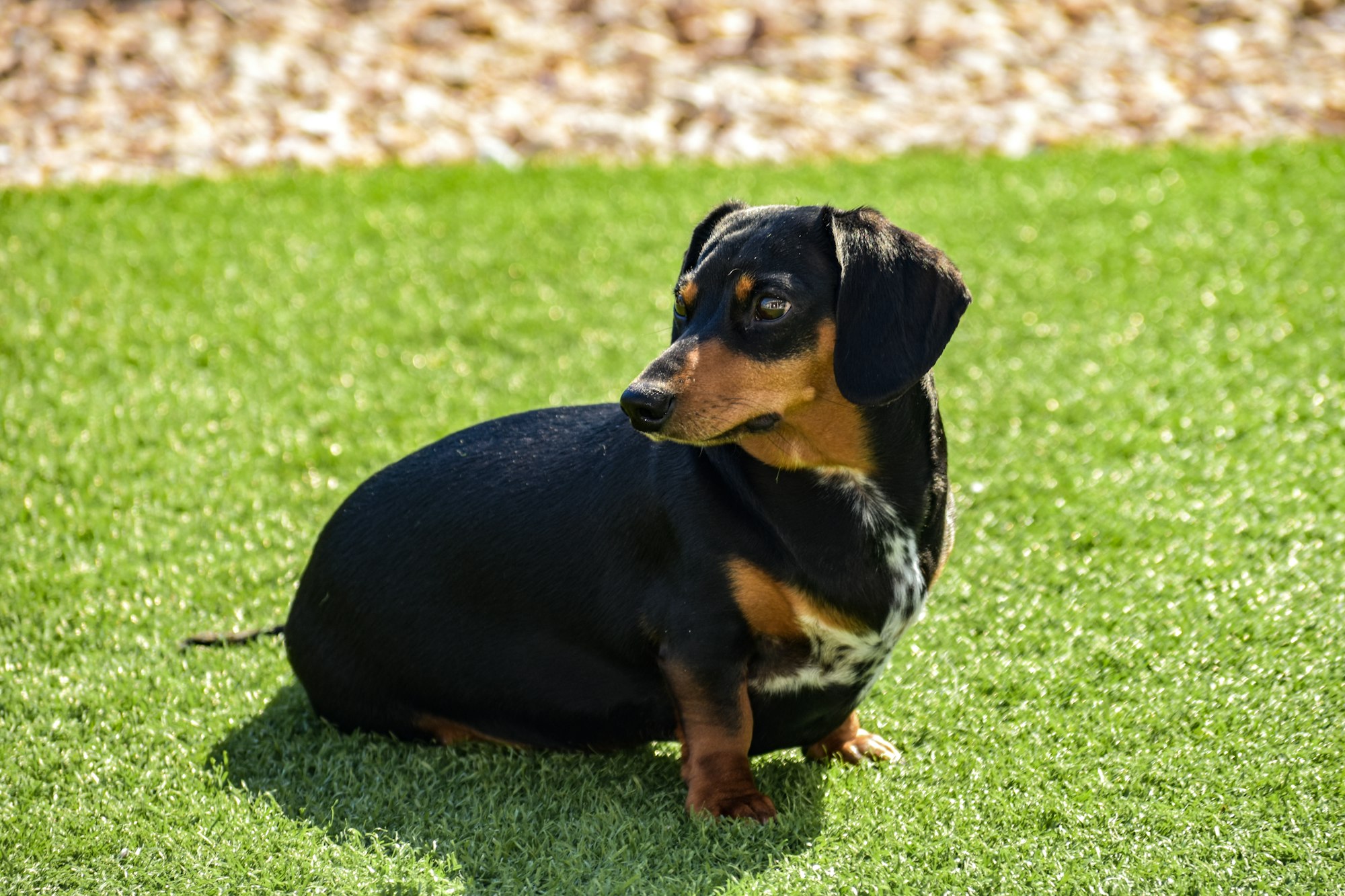With their compact size and irresistibly sweet demeanor, miniature dachshunds have swiftly become a favorite among dog enthusiasts. These small yet spirited canines boast a unique combination of endearing looks and lively personalities, making them an ideal companion for various lifestyles. In this comprehensive article, we will explore the rich history and distinctive characteristics of these delightful dogs.
We'll delve into the nuances of their personality, the care they require, and the unique joys they bring to their owners. From understanding their origins to appreciating their unique traits and needs, this article aims to provide a thorough insight into the world of miniature dachshunds, offering valuable guidance for current and prospective owners alike.

Origins and History:
Today's miniature dachshunds, while small in stature, carry with them a rich and intriguing historical background. These tiny delights, known for their boundless joy and endearing nature, have origins that span back through an intriguing tapestry of history. This exploration will take us on a captivating journey through time, revealing the transformative path these charming dogs have taken.
From their early beginnings to their evolution into the beloved pets we know today, we will uncover the various roles and environments that have shaped the miniature dachshund. Our journey will delve into the breed's development, the historical context that influenced their breeding, and how their distinctive characteristics were honed for specific purposes. Join us as we trace the lineage of these pint-sized wonders, gaining a deeper appreciation for their enduring appeal and the legacy they carry forward.
The Backstory:
The story begins with their larger cousins, the standard dachshunds. Originally bred in Germany for hunting purposes, these happy dogs were prized for their courage and tenacity in the face of burrowing prey. But as the saying goes, good things come in small packages, and so the miniature dachshund made its debut.
Evolution into Miniature Marvels:
Selective breeding played a crucial role in downsizing these hounds without compromising their hunting prowess. The result? A miniaturized version with the same spirited attitude but a more manageable size. From hunters to companions, miniature dachshunds underwent an evolution that transformed them into the lovable lapdogs many adore today.

Adorable Characteristics: Unwrapping the Charm Package
Now that we've traveled back in time, let's fast forward to the present and explore what makes miniature dachshunds the heart-stealers they are.
Distinctive Appearance:
Picture this: a long body, short legs, and a tail that wags with perpetual excitement. Miniature dachshunds are like living, breathing cartoons with their unique silhouette, making them stand out in any crowd. Those big, expressive eyes and floppy ears are just the icing on the cake!
Personality Plus:
But it's not just about looks. These little guys are brimming with personality. Despite their size, miniature dachshunds are known for their boldness, curiosity, and unwavering loyalty. They'll happily curl up in your lap or embark on a backyard adventure - whichever suits their fancy.
Varieties of Miniature Dachshunds: A Coat for Every Taste
It's time to dive into the aesthetic aspect of these mini wonders. Miniature dachshunds come in a delightful array of coat varieties, adding another layer to their irresistible appeal.
Short-haired, Long-haired, and Wire-haired:
Imagine a wardrobe filled with different outfits, each telling a unique story. That's the case with miniature dachshunds. The short-haired, long-haired, and wire-haired varieties offer not only distinct looks but also varying grooming requirements. Whether you prefer the sleek look or the fluffier version, there's a miniature dachshund for every taste.
Color Palette:
Just like selecting paint for a canvas, choosing the color of your miniature dachshund is a personal preference. From classic shades like red and black to the more exotic creams and dapples, the color palette of these dogs is as diverse as their personalities.
In conclusion, understanding the origins, adorable characteristics, and varieties of miniature dachshunds adds layers to the tapestry of joy they bring into our lives. From their humble beginnings as hunters to becoming cherished companions, these little wonders continue to leave paw prints on our hearts.
Suitability as Family Pets:
So, you've fallen head over heels for the miniature dachshund's charm, and now you're wondering - are they the right fit for your family? Spoiler alert: these tiny tail-waggers make fantastic family pets!
The Compact Companions:
Despite their size, miniature dachshunds pack a punch when it comes to companionship. Their affectionate nature makes them great partners for families of all shapes and sizes. Whether you have energetic kids or prefer a quieter household, these little dogs adapt like seasoned pros.
Lap Dog Extraordinaire:
Picture this: movie nights with a mini dachshund curled up in your lap, providing warmth and unconditional love. Their loyalty knows no bounds, and they thrive on being an integral part of the family dynamic.

Training and Socialization: Unleashing the Best in Your Mini Marvel
Now that you're sold on the idea of a miniature dachshund as a family pet, let's talk about the keys to ensuring a harmonious relationship: training and socialization.
Clever Canines:
Miniature dachshunds are smart cookies. Training them is a breeze when you tap into their intelligence. Basic commands like sit, stay, and fetch become second nature to these little learners. Just remember, positive reinforcement goes a long way - treats and belly rubs work like magic!
Social Butterflies:
These dogs thrive on social interaction. Introducing them to various people, pets, and environments from an early age ensures they grow up to be well-rounded individuals. Socialization is the secret sauce to preventing any potential shyness or overprotectiveness.
Health Considerations: Nurturing the Well-being of Your Mini Sidekick
Alright, let's address the elephant in the room - health considerations. Every pet parent wants their furry friend to live their best, healthiest life, and the same goes for miniature dachshunds.
Back to Basics:
Due to their unique body shape, miniature dachshunds are prone to back issues. It's like having a long bridge - strong but needing extra support. Be mindful of activities that strain their backs, and invest in ramps or stairs to help them access higher spots without risking injury.
Watch the Waistline:
Maintaining a healthy weight is crucial for these little guys. Obesity can exacerbate back problems and lead to other health issues. A balanced diet, regular exercise, and portion control are your allies in keeping your miniature dachshund fit and fabulous.
Nutritional Needs:
Now that you've welcomed a miniature dachshund into your home, it's time to talk about keeping their engines running smoothly through proper nutrition. Think of it as crafting a gourmet menu for your petite pal.
Size Matters:
Considering their size, miniature dachshunds don't require massive portions. However, the quality of their food is paramount. Opt for high-quality dog food that meets their specific needs, and don't forget to adjust portions based on their activity level and age.
Protein Power:
Protein is the superhero in their diet, promoting muscle health and overall vitality. Look for sources like lean meats, eggs, and high-quality dog food to ensure your mini sidekick gets the protein punch they need.
Watch the Treats:
Those soulful eyes can be hard to resist, but too many treats can lead to an expanding waistline. Keep treats in check, and consider healthy alternatives like small bits of veggies or special doggy treats designed with their nutritional needs in mind.

Exercise Requirements: Energize the Mini Dynamo
Despite their small stature, miniature dachshunds are energetic little dynamos. Regular exercise is not just good for their physical health but also essential for mental stimulation.
Walks, Walks, Walks:
Walking is a mini dachshund's love language. Daily walks are not just exercise; they're a chance for them to explore the world and satisfy their curious nature. Keep the leash handy, and let the adventures begin!
Playtime Galore:
Interactive play is a fantastic way to keep them entertained and physically active. Whether it's a game of fetch, hide-and-seek, or a squeaky interactive dog toy session, engage with your mini furball to keep their energy levels in check.
Mind the Back:
Given their unique physique, it's crucial to be mindful of activities that strain their backs. Avoid high jumps and invest in pet stairs or ramps to help them access elevated areas without putting unnecessary stress on their spines.
Grooming Tips: Stylish and Sleek Mini Makeovers
Now that we've covered nutrition and exercise, let's shift our focus to keeping your miniature dachshund looking and feeling fabulous with some grooming tips.
Coat Care:
Depending on the coat variety – short-haired, long-haired, or wire-haired – grooming needs vary. Short-haired dachshunds are low-maintenance, requiring a good brushing to keep shedding in check. Long-haired and wire-haired varieties need more attention to prevent matting.
Bath Time Bliss:
Regular baths keep your mini pal smelling fresh and clean. Use a dog-friendly shampoo, and make it a positive experience by rewarding them with treats and affection. Be sure to dry their ears thoroughly to avoid any moisture-related issues.
Dental Doting:
Don't neglect dental care! Miniature dachshunds can be prone to dental problems, so regular teeth brushing is a must. Dental chews and toys can also help keep their pearly whites in top-notch condition.
Miniature Dachshunds in Pop Culture:
Ever wondered if your pint-sized pal could be a celebrity? Well, miniature dachshunds have indeed carved out their own niche in pop culture, proving that good things do come in small packages.
Hollywood's Little Darlings:
From the big screen to television, miniature dachshunds have left paw prints in the entertainment world. Remember the adorable pup stealing scenes in that rom-com you love? Chances are, it was a miniature dachshund stealing hearts with its undeniable charm.
Literary Legends:
It's not just in movies – these little wonders have also graced the pages of literature. Authors have often chosen miniature dachshunds as literary sidekicks, showcasing their lovable personalities and making them characters readers can't help but fall in love with.

Common Misconceptions: Busting Myths About Miniature Dachshunds
Now, let's address the elephant in the room – the common misconceptions surrounding miniature dachshunds. These little guys often get a bad rap, but it's time to set the record straight.
Stubborn or Selective?
Some say miniature dachshunds are stubborn, but let's reframe that. These dogs are independent thinkers. They know what they want and when they want it. With patient and positive reinforcement-based training, they're more likely to showcase their cleverness rather than stubbornness.
Fragile or Resilient?
Given their elongated bodies, there's a misconception that miniature dachshunds are delicate. While it's true they need some extra care to prevent back issues, these dogs are more resilient than you think. With proper support and mindful activities, they can be as robust and adventurous as any other breed.
Community of Miniature Dachshund Enthusiasts: Uniting the Miniature Mania
If you're smitten by these little wonders, you're not alone. The internet has become a hub for miniature dachshund enthusiasts to connect, share stories, and seek advice. Welcome to the vibrant community!
Online Paw-Prints:
From forums to social media groups, there's a space for everyone who adores miniature dachshunds. Whether you're a seasoned owner or thinking about welcoming one into your home, these online communities provide a wealth of knowledge, support, and, of course, adorable pictures.
Meetups and Events:
Beyond the digital realm, there are miniature dachshund meetups and events happening worldwide. Picture a sea of tiny tails wagging in unison as these furry friends come together for playdates. It's not just a community; it's a mini-dachshund extravaganza!

Choosing the Right Miniature Dachshund:
Alright, buckle up because choosing the right miniature dachshund is like picking the perfect flavor of ice cream – there are endless options, and they're all pretty darn delightful. Let's navigate this decision-making journey together.
Know Thyself:
First things first, ask yourself what you're looking for in a furry companion. Are you after an energetic partner for outdoor adventures, or do you prefer a laid-back snuggle buddy? Knowing your lifestyle and preferences is key to finding the miniature dachshund that fits like a glove into your life.
Color Me Puppy:
Sure, it might sound superficial, but let's face it – looks matter. Miniature dachshunds come in a kaleidoscope of colors, from classic reds to striking dapples. Consider which color variety tugs at your heartstrings and makes you go, "Yep, that's my dog!"
Reputable Breeder vs. Rescue Route:
Deciding where to get your miniature dachshund is a biggie. Reputable breeders ensure a pup's health and often provide valuable insights into their lineage. On the flip side, rescues offer the chance to give a loving home to a dog in need. Consider your preferences and ethical considerations when making this choice.
Meet the Parents:
When you've narrowed down your options, try to meet the pup's parents if possible. It's like meeting the in-laws before committing – you get a sense of what your pup's temperament and potential health might be like.
Health Matters:
Speaking of health, ensure the breeder or rescue provides health records. Knowing about vaccinations, past health issues, and the general well-being of your prospective pooch is crucial for a happy and healthy future together.
The Gut Feeling:
Last but not least, trust your instincts. When you meet that miniature dachshund pup and your heart does a little happy dance, you'll know you've found your match. It's the canine version of love at first sight.

Conclusion
In conclusion, miniature dachshunds offer more than just their diminutive size and captivating looks; they bring a distinct blend of joy, charm, and companionship into our homes. By gaining an understanding of their rich history, distinct characteristics, and the practicalities of their care, we can foster a more profound and rewarding relationship with these delightful dogs.
These little canines are not just pets; they are companions with a storied past and a personality that can significantly enrich our lives. Their spirited nature, combined with their affectionate demeanor, makes them an ideal choice for various households.
As we close this exploration, it’s evident that owning a miniature dachshund is not just about providing a home for them; it's about embarking on a journey filled with love, learning, and mutual growth. Whether you’re a long-time dachshund enthusiast or considering bringing one into your life, understanding these aspects is key to a harmonious and joyful coexistence with these charming, pocket-sized wonders.
Frequently Asked Questions:
- Are miniature dachshunds good with children?
- Yes, miniature dachshunds are known for their friendly and affectionate nature, making them excellent companions for families with children.
- Do miniature dachshunds require a lot of exercise?
- Despite their small size, miniature dachshunds have moderate energy levels and benefit from regular exercise to stay happy and healthy.
- What are the common health issues in miniature dachshunds?
- Common health issues include back problems, obesity, and dental concerns. Regular veterinary check-ups are essential for preventive care.
- How can I find a reputable breeder for a miniature dachshund?
- Look for breeders with a good reputation, ask for references, and ensure they prioritize the health and well-being of their dogs.
- Are miniature dachshunds easy to train?
- With consistency and positive reinforcement, miniature dachshunds can be trained effectively. Patience is key to their successful training.






